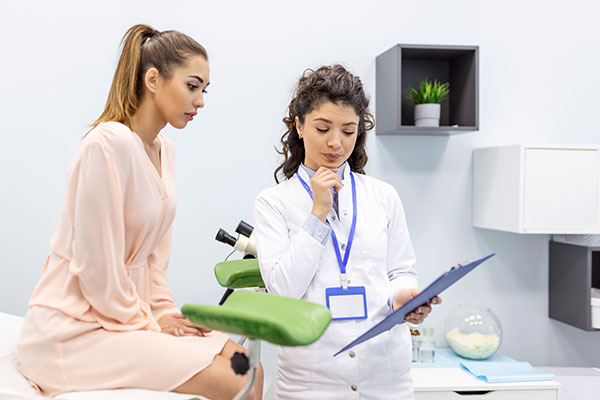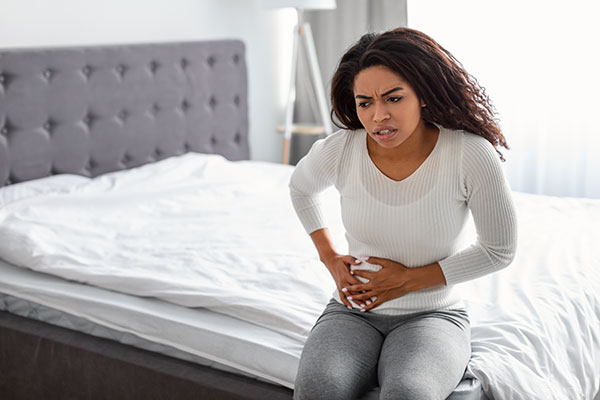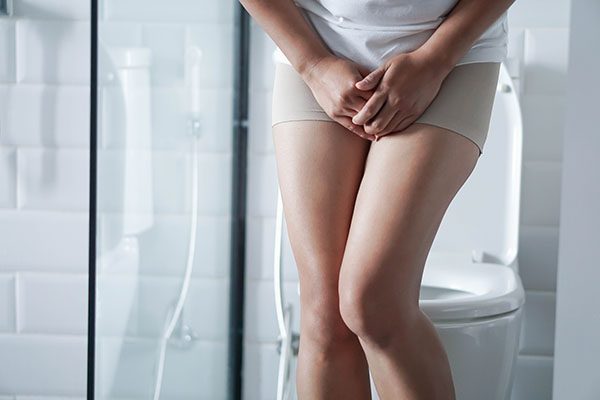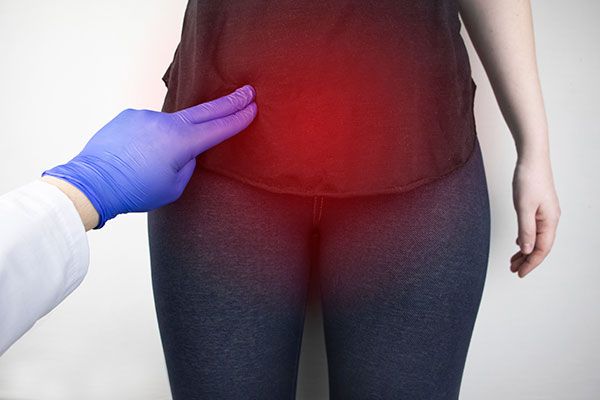For many women experiencing bladder control issues, Kegel exercises are often the first recommended solution. Kegels can strengthen the pelvic floor muscles and provide relief from mild cases of urinary incontinence. However, for some women, Kegels alone aren’t enough to resolve their bladder control problems.
Category: Gynecologic Care
The Danger of Cutting Calories for Future Fertility: What Teenage Girls Need to Know
In today’s culture, where there’s constant pressure to look a certain way, many teenage girls may feel the urge to cut calories in an effort to stay thin. But what often gets overlooked are the long-term consequences that restrictive dieting can have, especially when it comes to fertility and overall health.
Abnormal Pap Smear Results? Don’t Panic, But Do Follow Up
Receiving news that your Pap smear results are abnormal can be unsettling. However, it’s essential to understand what this means and the steps you can take to ensure your health and well-being. At North Pointe OB/GYN in Cumming, we are here to provide you with the information and support you need during this time.
Do I Really Need to See My Gynecologist?
Women undergo numerous physiological changes during their lifetime, from puberty through menopause and beyond. These transitions, while natural, can sometimes lead to health concerns that, if not addressed timely, can affect quality of life.
Top 10 Questions to Ask Your Gynecologist
Navigating your gynecological health can be a journey filled with questions and uncertainties. Here are the top 10 questions we recommend asking your gynecologist to empower your health and well-being.
How Menopause Can Impact Sleep
Menopause is a significant life transition for women, marked by the end of menstrual cycles and a decrease in reproductive hormones. While it’s a natural part of aging, menopause can bring about various symptoms that impact daily life, including sleep disturbances.
Ovarian Cyst Versus Kidney Stone: How to Tell the Difference
Pain in the abdominal region can be concerning, especially when its source is unclear. Among women, two common culprits of abdominal or pelvic pain are ovarian cysts and kidney stones. While both can cause significant discomfort, it’s essential to differentiate between them to ensure proper treatment. This blog from North Pointe OB/GYN in Cumming aims to shed light on the key differences between ovarian cyst pain and kidney stone pain.
What are Ovarian Cysts?
Ovarian cysts are fluid-filled sacs that develop in or on a woman’s ovary. Most of the time, these cysts are harmless and may not even produce any symptoms. However, if a cyst becomes large or ruptures, it can cause pain and other complications.
What are Kidney Stones?
Kidney stones are hard deposits made of minerals and salts that form inside the kidneys. When these stones move into the ureter (the tube connecting the kidney and bladder), they can cause severe pain and other symptoms.
Distinguishing Between Ovarian Cyst Pain and Kidney Stone Pain
Here are some factors to consider when trying to diagnose the source of your discomfort:
- Location of Pain:
- Ovarian Cyst: The pain is usually felt on one side of the lower abdomen, depending on which ovary has the cyst. It can be sharp or dull and may come and go.
- Kidney Stone: The pain typically starts in the back and side below the ribs, eventually radiating to the lower abdomen and groin.
- Nature of Pain:
- Ovarian Cyst: The pain can be constant or intermittent, potentially becoming severe if the cyst ruptures.
- Kidney Stone: Kidney stone pain is often sharp and sudden, increasing in intensity as the stone moves through the ureter.
- Other Symptoms:
- Ovarian Cyst: Symptoms may include bloating, menstrual irregularities, pelvic fullness, or pain during intercourse.
- Kidney Stone: Common symptoms include hematuria (blood in urine), frequent urination, nausea, vomiting, and fever if an infection is present.
- Duration:
- Ovarian Cyst: Pain can last anywhere from a few hours to a few days. Persistent pain should prompt a visit to the doctor.
- Kidney Stone: Pain can last until the stone is passed, which can be hours to weeks. Severe pain or pain accompanied by fever or nausea may require urgent care.
Diagnosis and Treatment
If you’re experiencing abdominal or pelvic pain, it’s essential to see a healthcare professional for an accurate diagnosis. They may use various diagnostic tools:
- For ovarian cysts, ultrasounds, CT scans, or MRIs can help visualize the cyst’s size and location.
- For kidney stones, ultrasounds, CT scans, and urine tests can detect the stone’s presence and its size.
Treatment varies based on the diagnosis:
- Ovarian Cysts: Often, they may resolve on their own. In some cases, birth control pills or surgery might be recommended.
- Kidney Stones: Treatment can include pain relievers, medical therapy to help pass the stone, or surgical procedures for larger stones.
Call Our Cumming Women’s Health Experts for Help
While both ovarian cyst and kidney stone pain can be uncomfortable, understanding their differences is vital for proper care. Always consult a healthcare professional if you experience persistent or severe abdominal or pelvic pain. At North Pointe OB/GYN in Cumming, we’re committed to providing expert guidance and care for all your gynecological concerns.
Why You Should See a Gynecologist About a UTI
Urinary Tract Infections (UTIs) are a common condition that many women experience at least once in their lifetime. While it might be tempting to self-diagnose or rely on over-the-counter remedies, it’s crucial to understand the importance of seeking professional medical advice for UTIs. At North Pointe OB/GYN in Cumming, we emphasize the importance of consulting with a gynecologist when you suspect a UTI. Here’s why:
1. Accurate Diagnosis Ensures Right Treatment
While the symptoms of a UTI—such as burning during urination, frequent urges to urinate, and lower abdominal pain—are quite characteristic, they can sometimes be confused with other conditions like yeast infections, interstitial cystitis, or sexually transmitted infections. A gynecologist can conduct proper tests to ensure you get an accurate diagnosis.
2. Avoid Complications
If left untreated or not treated correctly, a UTI can spread to the kidneys, leading to more severe complications. Seeking a timely consultation with a gynecologist ensures that the infection is addressed before it progresses.
3. Personalized Treatment Options
Each woman’s body is unique, and so is her medical history. A gynecologist can provide tailored treatment recommendations based on your specific condition, medical history, and any allergies or past reactions to medications.
4. Address Recurrent UTIs
For some women, UTIs can be a recurring issue. If you experience multiple UTIs within a year, it’s essential to consult a gynecologist who can offer insights into possible underlying causes and recommend preventive strategies.
5. Discuss Prevention Strategies
Apart from treating the current infection, a gynecologist can provide guidance on how to prevent future UTIs. This might include advice on hygiene, dietary changes, or potential lifestyle modifications.
6. Ensure Comprehensive Women’s Health
Often, a UTI can be a doorway to discuss other aspects of women’s health. When you visit a gynecologist at North Pointe OB/GYN, you can also address other concerns or undergo routine screenings to ensure holistic health.
7. Get Peace of Mind
Lastly, and importantly, consulting a professional about health concerns offers peace of mind. Knowing that you’re receiving care from specialists in women’s health ensures that you’re in safe and capable hands.
Reach Out to Us for Expert Women’s Care in Cumming
While UTIs are common, they shouldn’t be taken lightly. Ensuring timely and expert care can prevent complications, provide relief, and ensure your overall well-being. At North Pointe OB/GYN in Cumming, we’re committed to offering the best in women’s healthcare, ensuring that you feel understood, cared for, and empowered in your health decisions.
Menopause Management: Why a Personalized Approach Matters
For countless women, menopause represents a significant milestone—a transition that marks the end of the reproductive years. While it’s a natural phase of every woman’s life, menopause is often accompanied by a myriad of symptoms that can range from mildly inconvenient to significantly disruptive.
At North Pointe OB/GYN in Cumming, we firmly believe that menopause management is not a one-size-fits-all endeavor. Just as every woman is unique, so is her experience of menopause. Here’s why we advocate for individualized menopause management.
Varied Symptoms and Severity
Not all women experience menopause in the same way. Some may have a smooth transition with minimal symptoms, while others might face severe hot flashes, mood swings, or insomnia. Furthermore, the onset of these symptoms can vary greatly from one person to another. What might be a significant concern for one woman might be completely absent in another. A personalized approach allows for treatment that directly addresses each woman’s specific set of symptoms and their intensity.
Underlying Health Conditions
A woman’s overall health, including any pre-existing conditions, plays a critical role in determining how she experiences menopause. For instance, a woman with a history of migraines might experience an increase in frequency during menopause. Similarly, those with pre-existing mental health conditions, like depression or anxiety, might see a fluctuation in their symptoms. Customized menopause management considers these factors, ensuring that the chosen treatments don’t exacerbate any existing conditions.
Personal Preferences and Concerns
Every woman has her comfort level when it comes to treatment. Some might prefer hormone replacement therapy, while others might be looking for alternative treatments due to personal preferences or potential side effects. Tailored menopause management respects these preferences and offers solutions in line with each patient’s comfort and wishes.
Long-term Health Goals
The post-menopausal years can be vibrant and active. For this reason, menopause management must take into account a woman’s long-term health goals. Whether it’s maintaining bone health, ensuring cardiovascular wellness, or addressing weight management, a tailored approach will align treatment with these objectives.
Emotional and Psychological Well-being
Menopause doesn’t just have physical implications; it can deeply impact emotional and psychological well-being. Feelings of sadness, anxiety, or mood swings can be prevalent. By adopting an individualized approach, we ensure that the emotional and psychological facets of menopause are addressed alongside the physical symptoms.
Let Us Help You Manage Your Menopause in Cumming
Menopause, while a universal experience, is deeply personal in its manifestation. At North Pointe OB/GYN, we recognize the importance of understanding each woman’s unique journey through this life stage. Our commitment is to ensure that every patient receives care that’s tailored to her needs, ensuring a smoother, more comfortable transition through menopause and beyond.
Uterine Fibroids: Understanding the Why and When to Be Concerned
At North Pointe OB/GYN in Cumming, we are committed to providing comprehensive women’s health care. An important part of our services involves educating our patients about various conditions they might encounter during their reproductive years. One such condition that affects many women is uterine fibroids. Here, we delve into understanding why uterine fibroids develop and when to be concerned about them.
What Are Uterine Fibroids?
Uterine fibroids are non-cancerous growths of the uterus that often appear during childbearing years. They vary in size, from tiny and undetectable to the human eye, to large masses that can distort the shape and size of the uterus. The good news is that most fibroids do not lead to cancer and, in many cases, they cause no symptoms at all.
Why Do Uterine Fibroids Develop?
While the exact causes of uterine fibroids remain unclear, there are several factors that have been linked to their development:
- Hormonal Factors: Estrogen and progesterone, the hormones produced by the ovaries, promote the growth of the uterine lining during each menstrual cycle and may also stimulate the growth of fibroids. Fibroids contain more estrogen and progesterone receptors than normal uterine muscle cells do.
- Genetic Factors: If your mother or sister had fibroids, you’re at an increased risk of developing them as well.
- Other Growth Factors: Substances that help the body maintain tissues, like insulin-like growth factor, might influence fibroid development.
- Extracellular Matrix: This is a material that makes cells stick together and might also contribute to fibroid growth.
When to Be Concerned About Uterine Fibroids
For many women, uterine fibroids cause no noticeable symptoms. However, there are signs that may indicate the presence of fibroids, and some of these can be quite concerning:
- Heavy Menstrual Bleeding: One of the most common signs of fibroids is prolonged menstrual periods or excessive bleeding.
- Pelvic Pain or Pressure: Larger fibroids can cause a sensation of fullness or pressure in the lower abdomen.
- Frequent Urination: Due to their location and size, fibroids can press on the bladder causing frequent urination.
- Complications During Pregnancy: In some cases, fibroids might lead to complications such as fetal growth restriction or preterm delivery.
- Infertility: In rare cases, fibroids can block the fallopian tubes, making it harder for a fertilized egg to implant in the uterus.
If you experience any of these symptoms, especially if they impact your quality of life, it’s crucial to consult a healthcare professional. While these symptoms might indicate the presence of fibroids, they can also be signs of other medical issues. A timely diagnosis can lead to effective treatments and relief from discomfort.
Worried About Your Frequent Fibroids? Call North Pointe OB/GYN
Uterine fibroids, while common and often benign, can have a profound impact on a woman’s reproductive health. Understanding why they develop and being alert to the signs that might indicate a concern is crucial. At North Pointe OB/GYN, our team is here to support, advise, and provide the best possible care for all our patients. If you have concerns or questions about uterine fibroids or any other aspect of your reproductive health, don’t hesitate to reach out to us. Your health and well-being are our top priority.












